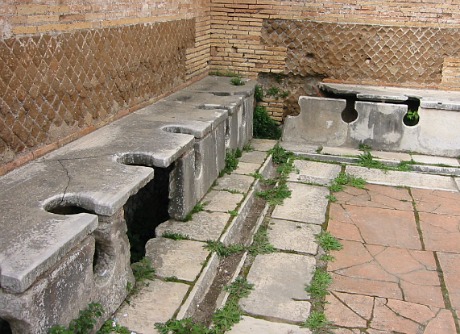One thing you’ll never see explored or even mentioned in any historical film is the level of hygiene available to the main characters. I realize that nobody wants to hear this stuff, but can I at least write one short article about it? We’re all so accustomed to living in total hygienic splendor (huge bathrooms, dynamic showers, soaps, deodorants, perfumes, facial cremes, hair gels) that we tend to forget or ignore how unclean and smelly things were in the old days, especially before the 19th Century.
It follows that historical films, none of which have ever been captured or projected with Aromarama-like technology, have never gotten into this. Until fairly recently (i.e., before intensely realistic pics like The New World and The Revenant) everyone in every historical film from whatever century has always been presented as looking relatively clean and well-groomed, and by inference agreeable smelling. But the fact is that most people stunk like animals in centuries past.

As I mentioned four years ago there wasn’t even a White House bathtub with hot running water until Abraham Lincoln’s first term. And when you’re talking about ancient Rome and especially Judea, which will be represented a few weeks hence in Timur Bekmambetov‘s Ben-Hur, forget it.
By our standards almost everyone except the wealthiest ancient Romans almost certainly had odor issues to varying degrees. The other day while sitting in an outdoor food court I noticed that a young guy sitting nearby (I’m not allowed to mention his ethnic heritage) smelled pretty gamey, and so I moved four or five tables away. If I was time-machined back to ancient Rome or Judea the stench would probably give me a heart attack.
And don’t even mention plumbing or toilets. The upper-crusters of 2000 years ago who routinely visited the plush Roman baths had no toilet privacy and no toilet paper, and they all shared an assortment of vinegar-soaked sponges that were used, cleaned and re-used over and over. (I know and I’m sorry.) Some kind of toothbrushes were used by the Roman 1%, but minty toothpaste and alcohol-based mouthwash were of course non-existent.
How hygienic were the nomadic Jesus Christ and his disciples? Are you kidding me? They might have waded into a nearby river or in the Sea of Galilee from time to time or occasionally sponged themselves next to a well, but they never saw any kind of soap their entire lives, they didn’t even know what a toilet seat looked like much less a hygienic sponge, and they certainly never owned toenail clippers or saw a pedicurist. (I wonder if Pontius Pilate was acquainted with that level of luxury?)
But all of this seems so gross to movie audiences it’s mostly not even hinted at, much less alluded to. And so almost all historic milieus are presented as relatively clean and fragrant and well-scrubbed as any pricey 20th or 21st Century home or restaurant or high-end health club. Or at least tolerable by our present standards.
Of course, our sense of aroma toleration changes with the eras. It wasn’t all that long ago when the smell of cigarette smoke was everywhere; now that’s all but gone, even in European environments that used to reek of unfiltered Gauloises as recently as 15 or 20 years ago.
